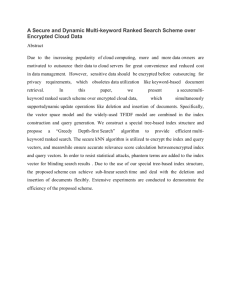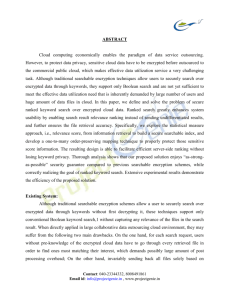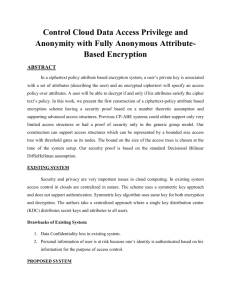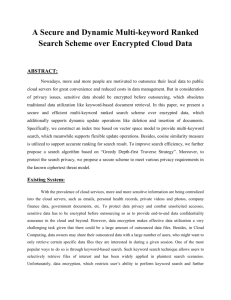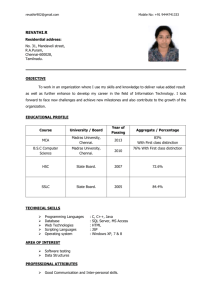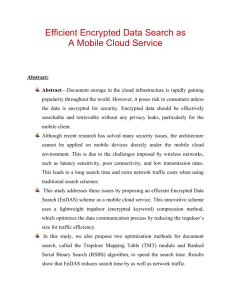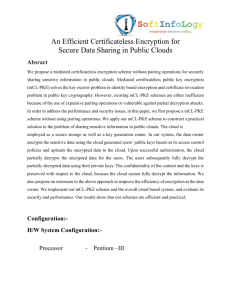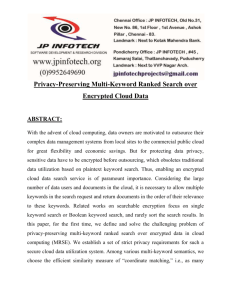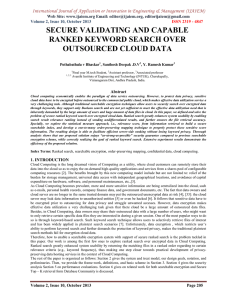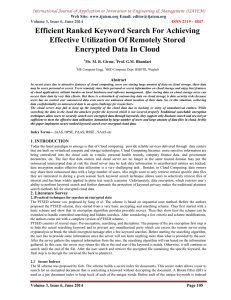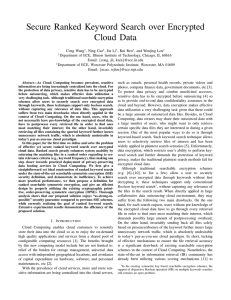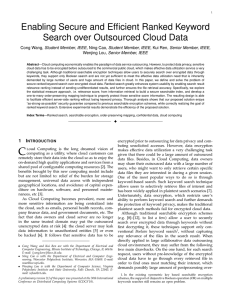Enabling Secure and Efficient Ranked Keyword Search over
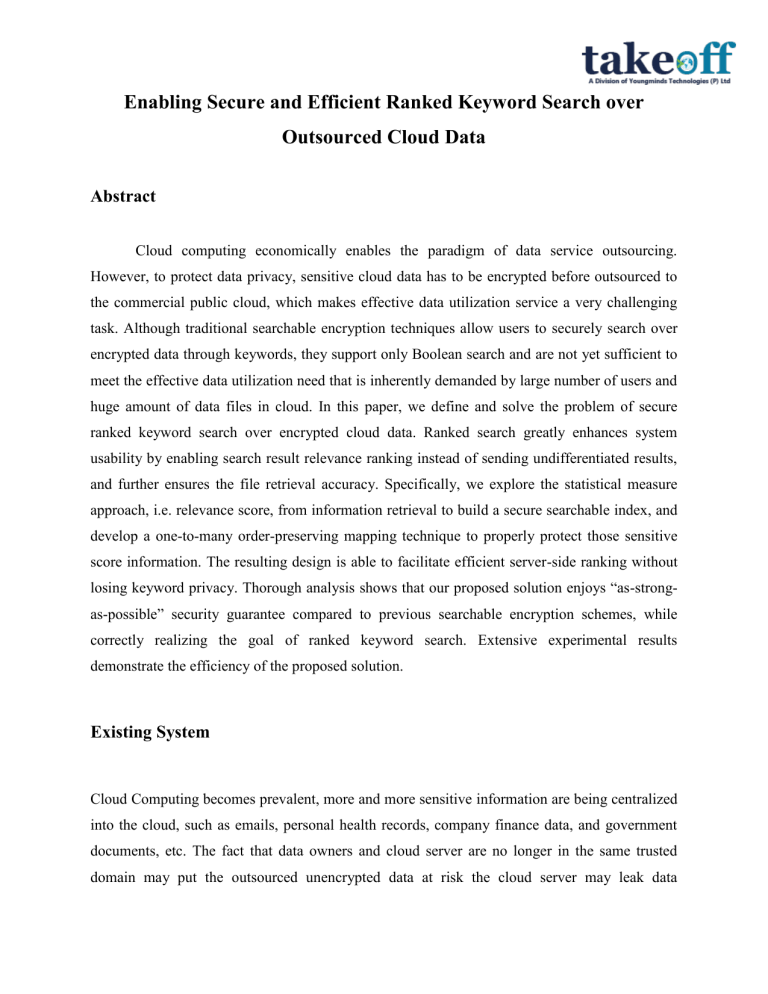
Enabling Secure and Efficient Ranked Keyword Search over
Outsourced Cloud Data
Abstract
Cloud computing economically enables the paradigm of data service outsourcing.
However, to protect data privacy, sensitive cloud data has to be encrypted before outsourced to the commercial public cloud, which makes effective data utilization service a very challenging task. Although traditional searchable encryption techniques allow users to securely search over encrypted data through keywords, they support only Boolean search and are not yet sufficient to meet the effective data utilization need that is inherently demanded by large number of users and huge amount of data files in cloud. In this paper, we define and solve the problem of secure ranked keyword search over encrypted cloud data. Ranked search greatly enhances system usability by enabling search result relevance ranking instead of sending undifferentiated results, and further ensures the file retrieval accuracy. Specifically, we explore the statistical measure approach, i.e. relevance score, from information retrieval to build a secure searchable index, and develop a one-to-many order-preserving mapping technique to properly protect those sensitive score information. The resulting design is able to facilitate efficient server-side ranking without losing keyword privacy. Thorough analysis shows that our proposed solution enjoys “as-strongas-possible” security guarantee compared to previous searchable encryption schemes, while correctly realizing the goal of ranked keyword search. Extensive experimental results demonstrate the efficiency of the proposed solution.
Existing System
Cloud Computing becomes prevalent, more and more sensitive information are being centralized into the cloud, such as emails, personal health records, company finance data, and government documents, etc. The fact that data owners and cloud server are no longer in the same trusted domain may put the outsourced unencrypted data at risk the cloud server may leak data
information to unauthorized entities or even be hacked. It follows that sensitive data has to be encrypted prior to outsourcing for data privacy and combating unsolicited accesses. However, data encryption makes effective data utilization a very challenging task given that there could be a large amount of outsourced data files. Besides, in Cloud Computing, data owners may share their outsourced data with a large number of users, who might want to only retrieve certain specific data files they are interested in during a given session. One of the most popular ways to do so is through keyword-based search. Such keyword search technique allows users to selectively retrieve files of interest and has been widely applied in plaintext search scenarios.
Unfortunately, data encryption, which restricts user’s ability to perform keyword search and further demands the protection of keyword privacy, makes the traditional plaintext search methods fail for encrypted cloud data. Although traditional searchable encryption schemes allow a user to securely search over encrypted data through keywords without first decrypting it, these techniques support only conventional Boolean keyword search1, without capturing any relevance of the files in the search result. When directly applied in large collaborative data outsourcing cloud environment, they may suffer from the following two main drawbacks.
Drawbacks
1.
On the one hand, for each search request, users without pre-knowledge of the encrypted cloud data have to go through every retrieved file in order to find ones most matching their interest, which demands possibly large amount of post processing over-head;
2.
On the other hand, invariably sending back all files solely based on presence/absence of the keyword further incurs large unnecessary network traffic, which is absolutely undesirable in today’s pay-as-you-use cloud paradigm. In short, lacking of effective mechanisms to ensure the file retrieval accuracy is a significant drawback of existing searchable encryption schemes in the context of Cloud Computing.
Proposed System
Our work is among the first few ones to explore ranked search over encrypted data in cloud computing. Ranked search greatly enhances system usability by returning the matching files in a ranked order regarding to certain relevance criteria (e.g., keyword frequency), thus making one step closer towards practical deployment of privacy-preserving data hosting services in the context of Cloud Computing. To achieve our design goals on both system security and usability, we propose to bring together the advance of both crypto and IR community to design the ranked searchable symmetric encryption scheme
, in the spirit of “as-strong as-possible” security guarantee. Specifically, we explore the statistical measure approach from IR and textmining to embed weight information (i.e. relevance score) of each file during the establishment of searchable index before outsourcing the encrypted file collection. As directly outsourcing relevance scores will leak lots of sensitive frequency information against the keyword privacy, we then integrate a recent crypto primitive order preserving symmetric encryption (OPSE) and properly modify it to develop a one-to-many order-preserving mapping technique for our purpose to protect those sensitive weight information, while providing efficient ranked search functionalities.
Advantages
1) We define the problem of secure ranked keyword search over encrypted cloud data, and provide such an effective protocol, which fulfills the secure ranked search functionality with little relevance score information leakage against keyword privacy.
2) Thorough security analysis shows that our ranked searchable symmetric encryption scheme indeed enjoys “as-strong-as-possible” security guarantee compared to previous
SSE schemes.
3) We investigate the practical considerations and enhancements of our ranked search mechanism, including the efficient support of relevance score dynamics, the authentication of ranked search results, and the reversibility of our proposed one-to many order-preserving mapping techniques.
4) Extensive experimental results demonstrate the effectiveness and efficiency of the proposed solution.
Hardware & Software Requirements:
Hardware Requirement
CPU type : Intel Pentium 4
Clock speed : 3.0 GHz
Ram size : 512 MB
Hard disk capacity : 40 GB
Monitor type : 15 Inch color monitor
Keyboard type : internet keyboard
Software Requirements
•
•
•
•
Operating system :- Windows XP Professional
Front End :- Microsoft Visual Studio .Net 2008
Coding Language : - ASP.NET, C# .NET.
Database :- SQL Server 2005
